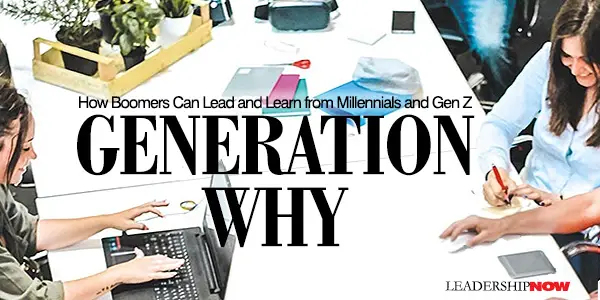 |
 |
06.05.23

Generation Why: How Boomers Can Lead and Learn from Millennials and Gen Z
MUCH has been written about how the Millennial and Z generations are different, their likes and dislikes, and idiosyncrasies. In Generation Why: How Boomers Can Lead and Learn from Millennials and Gen Z, McGill University professor Karl Moore asks why. He goes behind the observable behaviors and looks at the events that shaped their worldview to better understand why they are the way they are. Every generation has experienced pivotal events and cultural forces that have shaped their lives and how they react to life. Depression-era kids move differently in the world as they grow older than those that grew up in more prosperous times. Their worldviews are different, so they see the world through different values, expectations, and motivations. I am a Boomer, so my view regarding trust, authority, and truth, for example, is different than those generations that came after me. The Millennial and Z generations have a Postmodern worldview states Moore. Our education has a huge impact on how we believe the world does and should work. Moore writes: What university students are taught during pivotal years of their schooling very much influences their behaviour at work and their view of how they want to be led. Though, given their worldview, led may be too strong a word – even manage may be too strong. Perhaps it would be better to say, worked with. The world has changed, and what many of us have been taught is no longer relevant in today’s world. The chart below illustrates some of this change.
The Millennial and Z outlook involves contemporary perspectives on four important leadership issues, which Moore examines in this book:
Moore interestingly observes, “The knowledge of younger generations, to them, feels (most often, rightfully) more relevant and valuable than the “dated” understanding of the older generation. To a considerable degree, we older people are just not as valuable as older people were thirty years ago when we were starting out.” After a fascinating look at where these new generations’ worldviews came from, Moore then offers tips on how to work more effectively with Postmoderns, such as: Privilege all voices. Slow down and listen. “Millennials/Zers firmly believe that their story, or their personal and subjective truth, is as good as anyone else’s, regardless of their shortcomings in experience, age, or educational achievement. However, I argue that, contrary to popular belief, Millennials are not acting entitled, they are simply misunderstood. This is part of a larger characteristic of the Millennial/Z generations, which can be described as the death of meta-narratives and the rise of micro-narratives.” Be authentic. This is a complex area that Moore explains well, incorporating a look at both constructive authenticity and existential authenticity. “It appears that “being comfortable with oneself ” and “knowing who one is” are the most relevant attributes of Postmodern authenticity.” In the age of social media, authenticity for Millennials/Zers is characterized by the consistency and continuity between their online personas and their lives. The more congruence there is between the two, the more authentic a person will appear to be to their peers. Create purposeful organizations and align personal and professional purpose. Nearly everyone wants to find meaning in their work. What is unique to Millennials and Gen Zers is that they were “found to be seeking purpose and meaning at such an early stage in their careers.” Millennials and Gen Zers tend to be loyal to roles or identities rather than to specific companies or organizations and thus want to feel a sense of control over their careers. Mentor (and reverse mentoring). Millennials and Zers often crave one-to-one relationships in the form of mentors. They are “hungry for great mentors who are willing to put in the time, accept multiple mentees, and be reverse mentored.” Because of the coaching and feedback received throughout their formative years, Millennials/Zers likely view their mentors as parental figures or teachers, rather than in the traditional role of employer or boss. Millennials/Zers surround themselves with a network of coaches; many Millennials/Zers have several advisors they turn to throughout their careers, for issues both major and minor.” Be open to reverse mentoring too. “Reverse mentoring, done well, can result in better-aligned strategies with a turbulent world and more implementable strategies for the whole organization.” Give feedback. Millennials and Zers need feedback. They depend on it. Moore explains why. Managers can use the SKS framework both to provide effective feedback: What should I stop doing? What should I keep doing? What should I start doing? Generation Why will help you to understand not only the Millennial and Z generations but also your own. These understandings will help any leader to form a basis for mutual respect and a productive and healthy work environment. 
Posted by Michael McKinney at 09:35 AM
|
BUILD YOUR KNOWLEDGE


How to Do Your Start-Up Right STRAIGHT TALK FOR START-UPS 
Grow Your Leadership Skills NEW AND UPCOMING LEADERSHIP BOOKS 
Leadership Minute BITE-SIZE CONCEPTS YOU CAN CHEW ON 
Classic Leadership Books BOOKS TO READ BEFORE YOU LEAD |